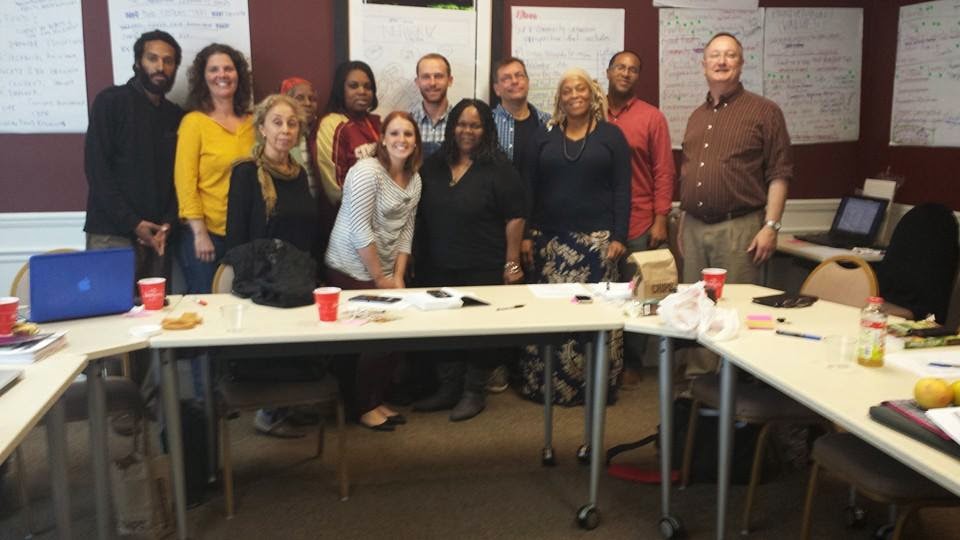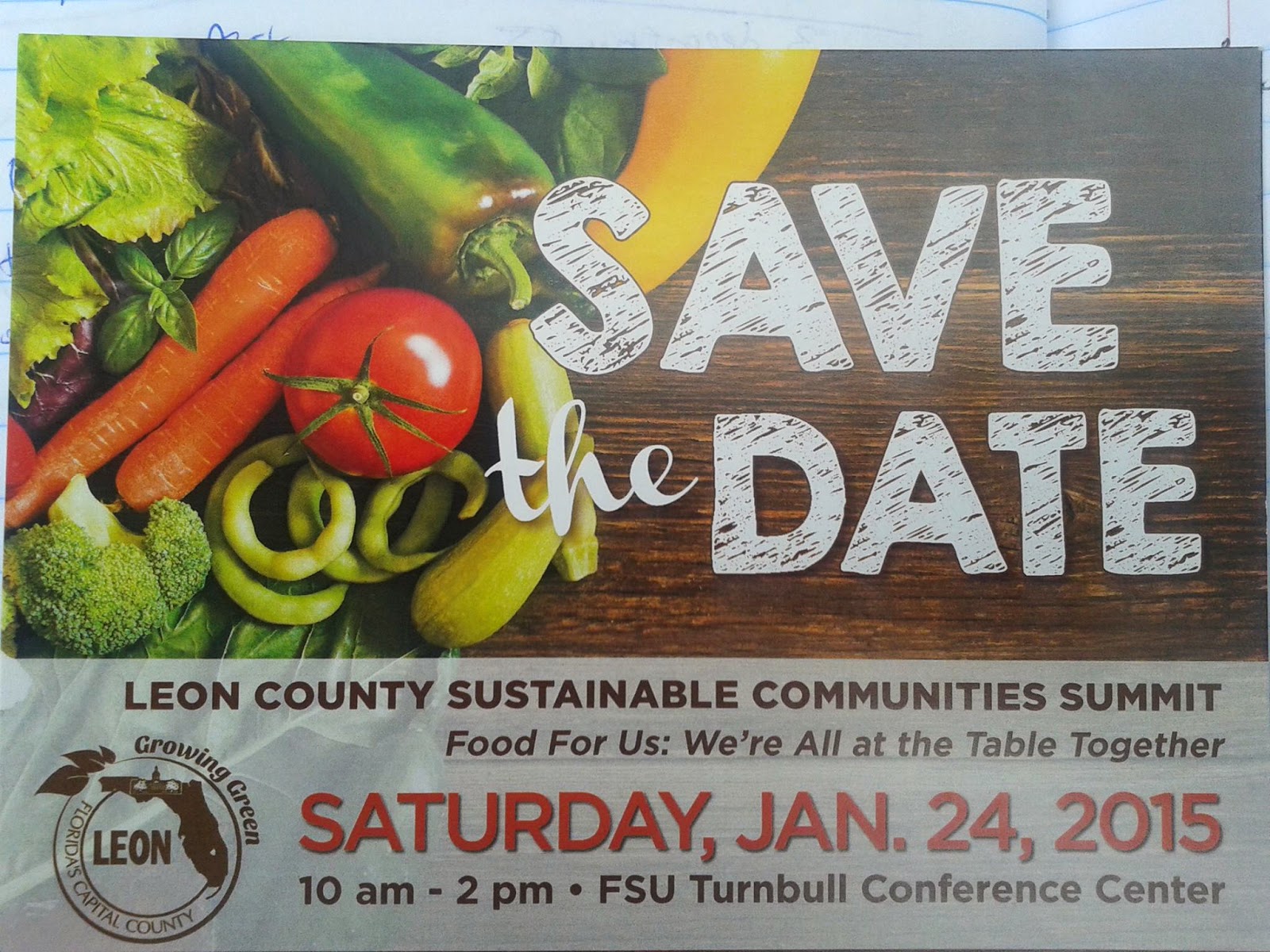 |
| TFN board, staff, and advisors joined for a retreat 11/22/14. |
Happy Thanksgiving.
I am grateful. Not only have I had a chance to travel the US the pasted six months -- not to mention I will be traveling internationally with Mary Elizabeth come January-- I've been wildly lucky to spend the last two weeks in Tallahassee. I had a chance to visit family, share meals, and catch up. There was also time to check in with loads of good folks doing great work around good food. I wish I could tell you all the stories.
But, I tell you what: instead of my stories, go collect your own at Leon County's Food Summit January 24th. All our key food stakeholders/players will be there, and we need all our area's peoples and networks present because the conversation and the survey they collect is going to help set regional food strategy. Be there.
- - -
One of the highlights of my time in Tallahassee was the Tallahassee Food Network (TFN) board retreat. We reflected at length on our four year history as a "regional coalition of the global movement that works to grow community-based (good) food systems." (You can check out the history here: TFN 2013 Mini-Report). Our impact includes developing a coalition of over
700 affiliates including over 100 organizations. Solely amongst those organizations, TFN fostered roughly 200+ partnerships and over 700 personal relationships. This new fabric of community has fostered new projects, programs, organizations, businesses, funding avenues, policy adoption, and, frankly, a community-wide shift in the importance placed on food issues (as evidenced by city, county, and other major institutions adopting food-related priorities-- including the above mentioned Food Summit). The impact of our network is even more impressive when you consider that TFN has functioned on very few (financial) resources and minimal part-time staffing.
Paul Ledford, CEO of Florida Hospice hosted and joined us last Saturday. (Thanks Paul). He pointed out that TFN's history of impact demonstrates a high level of organizational innovation.
His comment renewed a question I've been wrestling with for a while: What makes for the most effective, innovative and impactful group/team? How are great groups organized, structured, unstructured, or led/coordinated? Point being: how do we get impressively large, sustained success? And because my mind always errs this direction: how do we grow and sustain social movements? -- Specifically, how do we build from TFN's history to do even better as an organization and as a networked local/regional/national/international good food movement?
Based on my experience with community gardens, which are 90% community and 10% garden, I know human infrastructure, organization, and facilitative leadership is key, so I've been collecting a lot of material on the subject for my own edification. Below you'll find some of the resources I've collected. One day, I'll likely weave these ideas into a book of strategies and stories about our food movement. For now, click on what you think will serve you in enacting your food dreams.
Happy Thanksgiving.
- - -
-->"What are the physical spaces that foster innovation?" Often breakthroughs requires a "hunch" in one's brain "colliding" with hunches from others' brains
-->My take away from his book (Ripples from the Zambezi) on what he calls "Enterprise Facilitation": Don't ever give anyone an idea. And don't try to motivate them. Rather: listen for their ideas and foster and facilitate. Defer initiative to the person you're working with.
Open Space Technology
-->A way of hosting meetings or retreats with a small or very large group beginning without any formal agenda beyond the overall purpose of theme.
Collective Genius
-->"The role of a leader of innovation is not to set a vision and motivate others to follow it. It's to create a community that is willing and able to generate new ideas." "The question is not 'How do I make innovation happen?' but, rather, 'How do I set the stage for it to happen?"
Netflix Culture: Freedom and Responsibility
-->As organizations grow, they necessarily grow in complexity. Rather than policies and procedures to minimize error, outpace complexity with dynamic people and by providing context (not by exerting control. E.g., no vacation policy). Creative/dynamic people are 2-10x as productive and achieve non-linear impact. It's not about working hard; it's about what you get done.
Drive: The Surprising Truth about What Motivates Us
-->Pay people enough to take money off the table of worries. Then set up an environment where autonomy, mastery, and purpose are interwoven into your organizational structure/expectations.
Asset-Based Community Development (ABCD)
-->Everyone has something to bring to the table (assets): skills & ideas, resources, and associations. Often, the people you a)think are in the way or b)assume have the least to offer are those who have the assets you're missing. People in affected communities always hold the trump card assets for successful planning and implementation for projects/programs targeting their communities.
-->Three types of people are required for social phenomenon to "tip," (spread like wild fire): connectors, "experts" (i.e., the people other people hold in high regard for knowing about something), and sales people. Timing and situational context for an idea/trend/movement/story to spread is everything (e.g., Paul Revere rode at night meant people were in their houses).
"Open Source Insurgency - How to Start" by John Robb
-->Focus on "Big Tent" ideas that can unify. Avoid ideology. Lead by providing working models. Share ideas/open collaboration. Support the efforts of other groups under the big tent.
David and Goliath
-->Underdogs win by bucking convention, hustling, and playing by their own rule book. Lawrence of Arabia. Middle school girls playing full court basketball all game.
Emergence
-->Individual actors - if they can assess & respond to their environment and communicate with others about their action (whether we're talking about ants, computers, or people), they will display an intelligence greater than the sum of their parts. Greater ability to assess/respond and/or greater communication leads to increased emergence.
Outliers
-->The ecology of success. If people are surrounded by an ecology of opportunity and support, they do incredible things. Steve Jobs, Bill Gates, S.E. China rice farm children. Connects to ABCD.
David and Goliath
-->Underdogs win by bucking convention, hustling, and playing by their own rule book. Lawrence of Arabia. Middle school girls playing full court basketball all game.
Emergence
-->Individual actors - if they can assess & respond to their environment and communicate with others about their action (whether we're talking about ants, computers, or people), they will display an intelligence greater than the sum of their parts. Greater ability to assess/respond and/or greater communication leads to increased emergence.
Outliers
-->The ecology of success. If people are surrounded by an ecology of opportunity and support, they do incredible things. Steve Jobs, Bill Gates, S.E. China rice farm children. Connects to ABCD.
-->Interweave disparate viewpoints and people to enrich design development. Think holistically: start to finish. The need for project spaces (like the Purple House, Salvation Army Garden, Dunn Street).
The Long Haul
-->Put people in situations where they have to act on ideas, not talk about them. With, not for. Work on integration by integrating. Focus on structural change. Organizations are key to movements.
Rules for Radicals
-->Until you've achieved a balance of power between parties, "reconciliation" simply means, "I win, and you'd better get reconciled to the idea." "Communication only happens when people get what you're trying to get across to them." Change requires power. Without money, power comes from people. "In order to act, the people must get together."
-->Put people in situations where they have to act on ideas, not talk about them. With, not for. Work on integration by integrating. Focus on structural change. Organizations are key to movements.
Rules for Radicals
-->Until you've achieved a balance of power between parties, "reconciliation" simply means, "I win, and you'd better get reconciled to the idea." "Communication only happens when people get what you're trying to get across to them." Change requires power. Without money, power comes from people. "In order to act, the people must get together."
Organizing Genius
-->"Shabby" project spaces. Quirky leadership unafraid of people more talented/different than them. "Fueled by an invigorating, completely unrealistic view of what they can accomplish." Big-time "How" questions/goals. Leadership that insulates team from external evaluation/judgement.
-->"Shabby" project spaces. Quirky leadership unafraid of people more talented/different than them. "Fueled by an invigorating, completely unrealistic view of what they can accomplish." Big-time "How" questions/goals. Leadership that insulates team from external evaluation/judgement.
-->For hard issues/questions with no immediately apparent solutions, messy open-dialog is necessary to bring divergent perspectives into mix. Takes a long time, but expedites/ensures implementation. Tools for facilitation (drawing out, stacking, interrupting content to discuss process, chart writing, echoing, parking lot). Silence doesn't mean agreement.
Creativity, Inc
-->Pixar lost money for 20 years, and they found ways to shuffle from the financial back-corner of one business to another, and then they made Toy Story. Financial power-balancing by going public before partnership with Disney to prevent being steamrolled.
-->Pixar lost money for 20 years, and they found ways to shuffle from the financial back-corner of one business to another, and then they made Toy Story. Financial power-balancing by going public before partnership with Disney to prevent being steamrolled.
Keep Growing,
Nathan, Man in Overalls
--and, yes, I'm still getting my overalls dirty. Sundiata and I were doing a school garden just yesterday morning together.
Nathan, Man in Overalls
--and, yes, I'm still getting my overalls dirty. Sundiata and I were doing a school garden just yesterday morning together.

